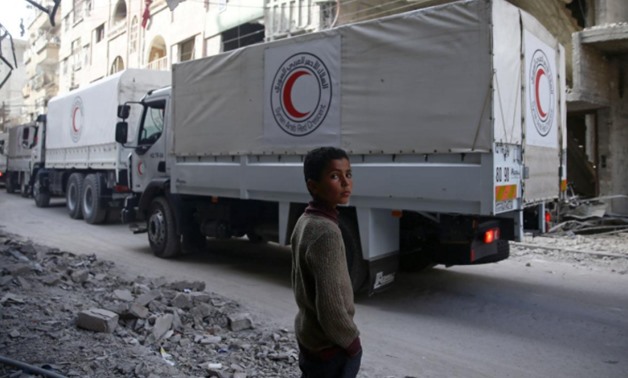
A boy stands as an aid convoy of Syrian Arab Red Crescent drives through the besieged town of Douma, Eastern Ghouta, Damascus, Syria March 5, 2018. REUTERS/Bassam Khabieh
CAIRO – 9 March 2018: After a long time of struggling, another aid convoy consisting of 13 food trucks finally found its way into the besieged city of Eastern Ghouta, Syria on Friday amid continuing airstrikes between the regime and opposition and armed groups.
The aid convoy, affiliated with the Syrian Arab Red Crescent, was supposed to reach the city on Monday; however, it was banned from entering due to excessive shelling between all parties, according to Reuters on March 9.
This is, however, not the first aid convoy to enter Ghouta this week. On March 5, 46 trucks carrying aid supplies managed to cross into the city after weeks of escalating violence.
The situation in Ghouta has been escalating in the past few weeks, especially with the failure of ceasefire agreements and the futility of the international meetings and negotiations to reach a political solution to end Syrian suffering.
Since the beginning of the shelling, about 931 civilians were targeted, according to the Syrian Observatory for Human Rights on Friday, March 9.
On March 2, Egypt expressed its concern over targeting civilians and mixing between them and armed groups. Egyptian Ambassador to the United Nations Human Rights Council (UNHRC) Alaa Youssef affirmed Egypt’s deep condemnation for the use of violence by all of the Syrian parties during the struggle. “Civilians and organizations were targeted as a result of not distinguishing between them and the armed groups,” he said.
During his speech at the urgent session for UNHCR regarding Syria, Youssef noted that Egypt was among the countries that participated in drafting the December 2017 law regarding delivering humanitarian aid to civilians as a necessity to ease part of their suffering.
He also implored the international community to cooperate in order to fight the internationally labeled terrorist groups, including Islamic State (IS), Al-Nusra Front and any other group pledging allegiance to them.
“These groups have been fueling the Syrian conflict for years and banning the international community from reaching a political solution and restoring Syria’s security and stability,” Youssef said.
Egypt has been a key player regarding reaching stable circumstances in Syria, especially in Ghouta. It has been announced more than once that any solution other than a political one will not end the struggle, as it won’t fulfill the Syrian people’s demands of a stable and secure country.
As per a request from Kuwait and Sweden, the United Nations Security Council gathered on Thursday, February 22 to vote on a draft law for a 30-day ceasefire in order to allow humanitarian aid to reach the city again.
The voting was delayed until Saturday, February 24 to allow for further discussions. The approved ceasefire was expected to temporarily end the Syrian people’s struggle and stop the siege that has been imposed on them for a long time; however, it was later announced to have failed.
The Syrian political situation has been deteriorating since protests emerged with the Arab Spring revolutions in 2011, when the opposition created the Free Syrian Army to face Syrian President Bashar al-Assad’s forces. The situation worsened when the Islamic State terrorist group began interfering in the country in 2014.
About 470,000 people have been killed since the beginning of the war as of February 2016, according to the latest data from the U.N. Office for the Coordination of Humanitarian Affairs. Some 1.6 million Syrians have been domestically displaced, while the number of refugees reached 4.8 million people, the data added.


Comments
Leave a Comment